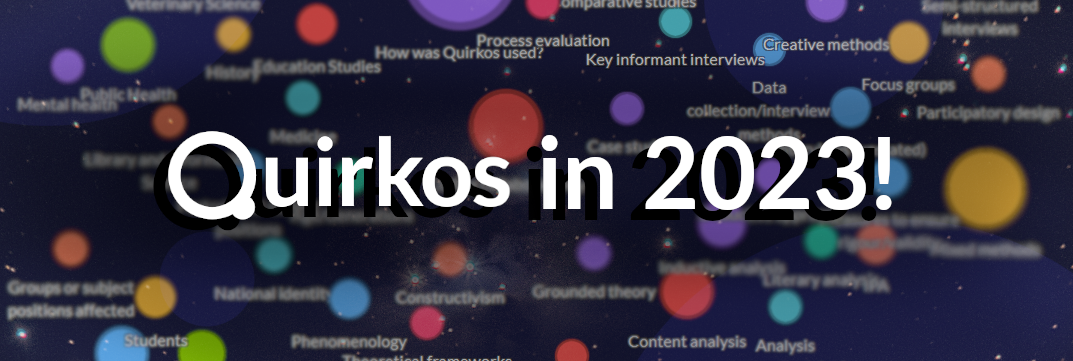Quirkos Unwrapped 2023: An Amazing Year in Qualitative Research!
Our users have had some fantastic achievements this year. Just from Google Scholar alone, in 2023 they completed and published approximately 20 monographs and book chapters, 170 journal articles and 180 doctoral and master's theses...

2023 has been another fantastic year for Quirkos! We traveled to AERA 2023 and the inaugural International Creative Research Methods conference, and we welcomed a new member to the team, Micheal, who has released some wonderful improvements to Quirkos Web!
We also released a whole new add-on to Quirkos Cloud: Quirkos Transcribe! And after it outperformed other transcription services in a test of accuracy, speed and price, we think it's rather brilliant.
But we're not just here to brag about us. Our users had some fantastic achievements this year. Just from Google Scholar alone, in 2023 Quirkos users completed and published approximately 20 monographs and book chapters, including:
- Seeking Reconciliation in a Context of Coloniality: A Study of White People’s Approaches in a Multicultural South African church by Marcus Grohmann
- 'Ducking and Diving: Why Boxing Clubs Hit the Targets Other Sports Cannot Reach in Deprived Communities' by David Barrett, Lee Edmondson, Robbie Millar, and P. Solomon Lennox
- 'Digitally Displaced? Embodied Pedagogy and Creative Arts Practice in a Time of COVID-19' by Shaz Oye
Researchers using Quirkos also published 170+ journal articles and finished 180+ doctoral and master's theses, from 106 different universities!
To celebrate and promote the work of our users, we've gathered together 10 open access articles published this year where the data was analysed in Quirkos.
This year, Quirkos users have...
Explored ways to connect and form identities
'Co-constructing effective collective intelligence networks in rare diseases: a mixed method approach to identify the parameters that matter for patients, professionals and policy-makers, piloted in Cyprus', by Victoria Antoniadou and Adamos Hadjipanayis.
This study evaluated the RARE-e-CONNECT online platform, and whether it improved the experience of diagnosing and treating rare diseases. The researchers used mixed-methods and grounded theory, using Quirkos to analyse qualitative data from questionnaires and forums on the platform. They found that social, regulatory and political contexts impacted the platform's reach; however the platform improved peer support and knowledge availability. It also improved patient-to-clinician communication, so diseases could be diagnosed sooner.
'Enhancing Caregiver Empowerment Through the Story Mosaic System: Human-Centered Design Approach for Visualizing Older Adult Life Stories', by Fang Gui, Jiaoyun Yang, Qilin Wu, Yang Liu, Jia Zhou, and Ning An.
This study tracked the creation of a new digital platform to organise the life stories of older adults, so professional caregivers could provide care that better took their life experiences into account. Gui et al conducted semi-structured interviews and workshops, and coded this data in Quirkos, gaining insight to design a more helpful prototype.
'One city two teams: A mixed approach study for exploring sports fandom', by Josefina C. Santana and Nilsa Marlen Téllez.
Santana and Téllez conducted narrative interviews with fans of the Atlas and Guadalajara football teams of Guadalajara, Mexico. They analysed the data using thematic analysis in Quirkos. While team loyalty was similar across both teams, Atlas fans were generally more impassioned and experienced greater levels of 'identity fusion' with their team, theorised to be the result of the team's poorer performance. Due to Guadalajara's better track record, their fans had more objective, less emotive reasons for their support, but also some more nationalistic ones, as the team is all-Mexican.
Improved medical and therapeutic provisions
'The experience of healthcare professionals implementing recovery-oriented practice in mental health inpatient units: A qualitative evidence synthesis', by Rinlita Chatwiriyaphong, Lorna Moxham, Rebecca Bosworth, and Grant Kinghorn.
Recovery-oriented practice focuses on patients' personal growth and agency rather than just mitigating immediate psychological symptoms. 10 qualitative studies across 2 decades were reviewed, which all explored professional perspectives on recovery-oriented practice in inpatient settings. Chatwiriyaphong et al coded the studies' results in Quirkos to find commonalities: while professionals understood the need to provide safe spaces for personal healing and recovery for mental health inpatients, the goals of inpatient facilities were often at odds with the goals of recovery-oriented care. Overcrowding, staff burnout, lack of appropriate resources, and the need to safeguard against crisis situations were major barriers. The researchers recommended more mental health professionals should be trained in recovery-oriented care, to help create better outcomes for patients in medicalised mental health settings.
'History Repeats Itself: The Relevance of Historical Pandemics to the Medical School Curriculum', by Molly Jones, Siobhan Quenby and Joshua Odendaal.
In light of the COVID-19 pandemic, Jones et al found that UK-based medical students had quite poor knowledge of pandemic history and influenza prevention. They gathered qualitative data to see if students would like pandemic history covered in the medical school curriculum. This data was analysed with Quirkos, using a grounded theory approach. Researchers and participants felt medical graduates would be better equipped to deal with future pandemics with more education on medical history. Jones et al. recommended pandemic history to be incorporated into the curriculum, and that medical education should involve a more narrative-based (and more qualitative!) approach to its core subjects.
Studied educational barriers and opportunities
'Dyslexia in the Malay Language in Singapore', by Hamadatun Najwa bte Yusuf Wahbi.
Malay students in Singapore are required to learn both English and Malay at school. This study aimed to identify the specific challenges of learning Malay with dyslexia. Yusuf Wahbi used reading tests to analyse specific linguistic features of the language that tended to be difficult, and conducted semi-structured interviews to explore why students with dyslexia are motivated to learn Malay. Quirkos was used to code the qualitative data inductively. Vocabulary was a significant challenge for the students, suggesting extended use and practice would be beneficial. Supportive environments, and the opportunity to communicate in a second language with family and friends, were key motivators for learning Malay.
'The Gender-Sexuality Continuum in K-12 Spaces: A Case Study of Five Male Educators Teaching Youth in New York City', by Pascal Rekoert.
Rekoert explored how frequent female gendering of teaching and dance occupations limits opportunities for male dance educators and students, and restricts gender roles available to boys and men. He conducted semi-structured interviews and a focus group with five male dance teachers, coding the data in-vivo using Quirkos and the Framework Method. He noted common occurrences of parents enforcing normative masculinity on their children, mistrust and homophobia towards male dance teachers and male teachers more generally. Participants reported a balancing act between engaging male students through role modelling, while needing to reinforce gender roles for best engagement by encouraging them towards more 'macho' styles of dance. Dance space provokes anxieties around performing gender in the right way, particularly as students became teenagers – but could also serve as a motivating outlet for male students, improving their educational experience overall.
Improved processes across creative, professional and market research spaces
'Let’s Just See What Happens: A Qualitative Case Study of Risk and Uncertainty in the Creative Process', by Wendy Ross and Mike Groves.
This article is a participatory case study into Mike Groves' creative practice in wood turning: working with tangible, natural materials that are frequently unpredictable. Managing the risks of using this material (and 'gambling' with the end result) is an inextricable part of the creative process, and not considered in linear concepts of creativity as being carefully planned and executed. Creativity was conceptualised as a complex and often inarticulable intermeshing of knowledge/skill, sensory input, luck, and adaptability. Data was collected by recording videos of Groves at work, and discussions between Ross and Groves while they rewatched the videos. Both were transcribed and inputted into Quirkos to establish recurring themes.
'Conformer or colluder? The human resource professional’s contribution to toxic leadership', by Tatiana Page and John J. Mgwenya.
This study conducted semi-structured interviews with corporate human resources professionals on dealing with toxic (that is, self-serving and abusive) organisational leaders. Coding the data in Quirkos, Page and Mgwenya found HR professionals often adopted a 'follower' role, particularly if the leader often went over their heads to make personnel decisions. Other obstacles included the emotional labour of HR roles and the paradox of needing to promote both business interests and accountability to mistreated employees. The study recommended increasing the organisational power of HR so they felt empowered to challenge management decisions, and maintaining records when HR policies were contravened, so toxic leadership cultures could be identified and curbed.
'Exploring consumer beliefs about novel fortified foods: A focus group study with UK-based older and younger adult consumers', by Rochelle Embling, Louise Neilson, Chloe Mellor, Mercy Durodola, Natalie Rouse, Alison Haselgrove, Katharine Shipley, Andrea Tales, and Laura Wilkinson.
This study explored responses to fortified foods, and when the nutritional value of fortifying is considered an 'acceptable' trade-off with taste and texture. Embling et al. used focus groups with a blind taste test, semi-structured interviews, and reflexive thematic analysis, coding the results collaboratively in Quirkos, and merging them to get a broader picture. Participants acknowledged the nutritional benefits of the foods, but taste and texture differences, and trust in manufacturers' claims of health benefits, remained key barriers.
We hope you enjoy reading these articles, and wish you happy holidays and a happy new year!
2024 will be big for us, so watch this space, and subscribe to this blog if you'd like to hear more from us next year! As well as adding some much-requested updates to Quirkos Web, we will also be releasing a free web course on qualitative research, fully overhauling all of our documentation to make it clearer and cross-platform, and building a database of studies that were aided by Quirkos!
If you'd like us to highlight your project using Quirkos, do get in touch – we'd love to profile it and raise awareness of your research!
